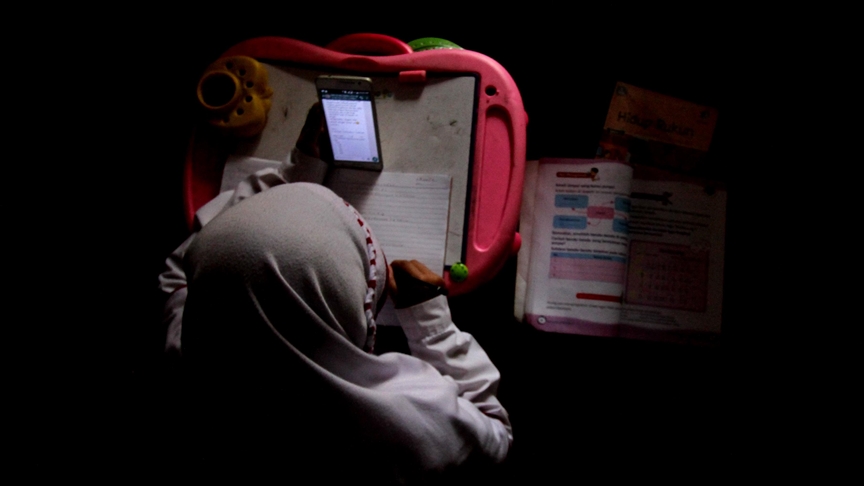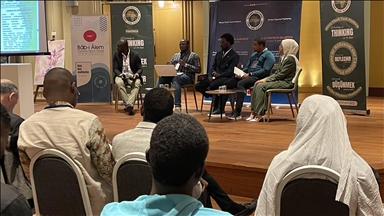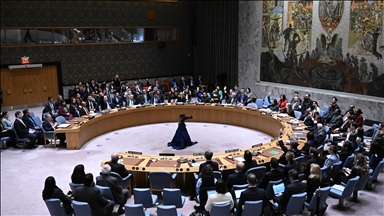Indonesia: Remote learning face hurdles amid pandemic
Students, teachers in rural areas find it hard to keep up with bad internet connections
 A student uses a mobile phone to do school tasks assigned by her teacher as government implemented online learning system amid coronavirus pandemic in Jakarta, Indonesia on July 21, 2020. ( Eko Siswono Toyudho - Anadolu Agency )
A student uses a mobile phone to do school tasks assigned by her teacher as government implemented online learning system amid coronavirus pandemic in Jakarta, Indonesia on July 21, 2020. ( Eko Siswono Toyudho - Anadolu Agency )
JAKARTA, Indonesia
The prolonged closure of schools in Indonesia because of coronavirus restrictions has sparked problems for students, teachers and parents.
Chandra Kriftaningtyas, a working mother, said she was overwhelmed assisting her twins in remote learning amid the pandemic as she had to be seated alongside her children throughout class.
"If I leave for a bit, I won’t be able to answer when my children ask a question. I need to attend the class so I can understand the problem. It’s like I’m studying in elementary school again,” she told Anadolu Agency.
As an employee of a television station, she said it is hard to finish her job while having to struggle with technical problems that often occur during remote lessons. She complained that the curriculum has become less effective.
"Until now, it has been almost eight months, there has been no firm decision from the government, whether to make an emergency curriculum or to lower the standard," she said.
During the pandemic, education in Indonesia has been transformed through online learning with live courses and digital course materials, and the government has made several attempts to maintain the effectiveness of distance teaching.
After education activities were suspended, Indonesia simplified its national curriculum, created online learning modules, strengthened the Learning Management System (LMS) platform and provided free internet as well as special training for students and teachers.
Unifah Rosyidi, chairwoman of the Indonesian Teachers Association (PGRI), said students in rural areas -- 40% of students in the country -- struggle to keep up with virtual learning due to poor internet access, forcing teachers to make visits for in-person lessons.
That has sparked problems for teachers, including travel distances they have to endure every day, limited teaching materials as well as scheduling visits.
"There are problems in terms of substance, distance, and teaching arrangement, making it ineffective and hard to achieve the standard required in modules," Rosyidi told Anadolu Agency.
The ineffective learning system amid the pandemic has also raised several other problems, including a deficit in learning achievement, students dropping out of school and child marriage.
"An emergency curriculum must be ensured so that no child has to repeat a year, then when we reach a normal situation, we need to analyze the deficit to make recovery,” she said.
Addressing the learning problems during the pandemic, Lr. Nizam, the education ministry’s director-general of higher education, said the scale of Indonesia’s education is too large, making it difficult to reach all levels.
"There are 64 million students in 400,000 schools in 80,000 villages, 524 regencies and cities, and 34 provinces, while education is managed by a local government and not all of them work actively and responsive,” he said.
The teachers association urged the government to carry out effective communication at every level, from pre-school to university.
"There needs to be effective communication and cooperation as well as new curriculum, teaching materials for those in the areas with a bad internet connection, and special training for teachers,” said Rosyidi.
*Writing by Rhany Chairunissa Rufinaldo from Anadolu Agency's Indonesian-language services in Jakarta.








